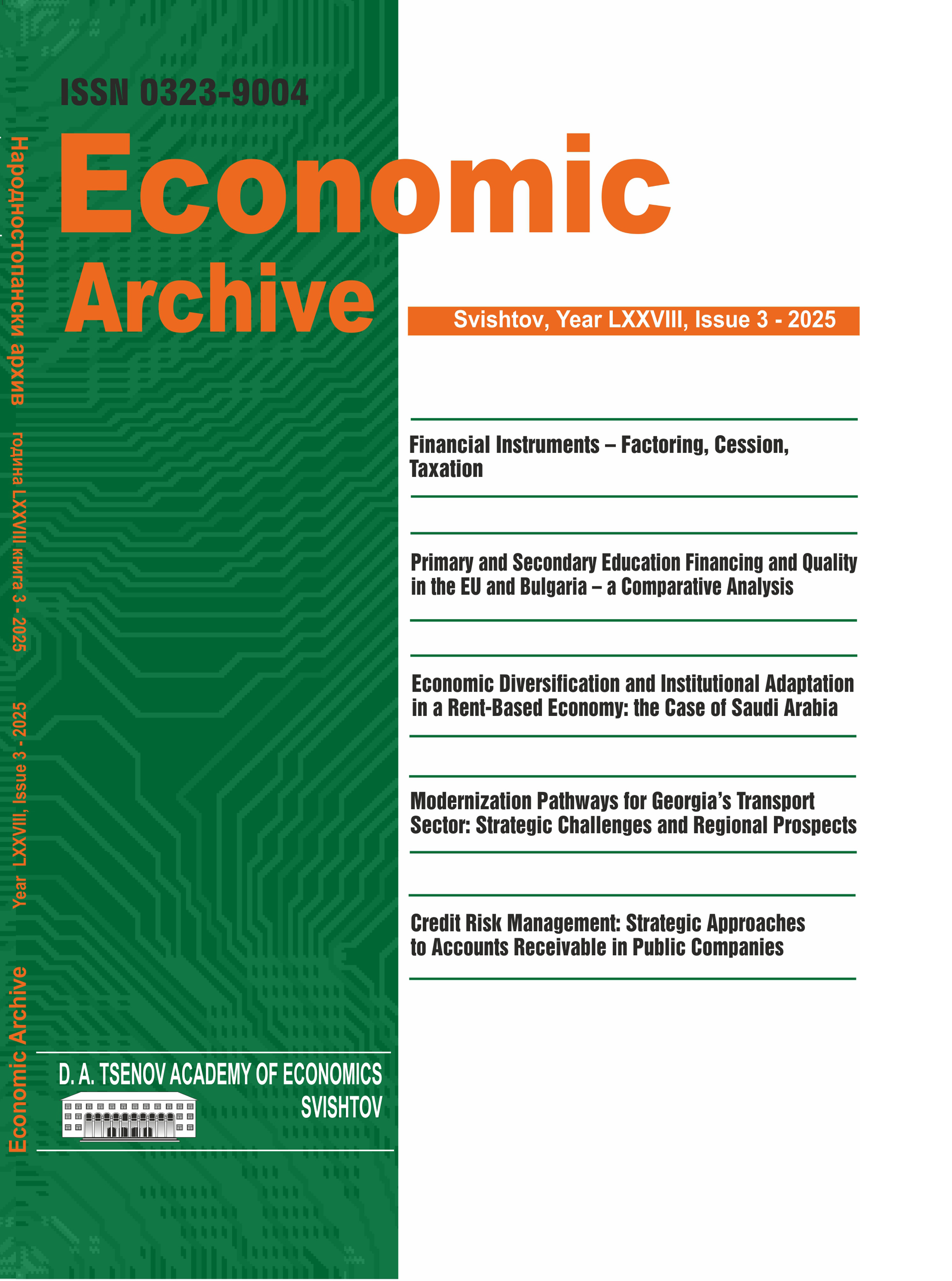
ISSN: 0323-9004-Book Edition
ISSN: 2367-9301-Electronic Edition

Boyko Petev Financial Instruments – Factoring, Cession, Taxation / 3 Lyudmil Naydenov Primary and Secondary Education Financing and Quality in the EU and Bulgaria – a Comparative Analysis / 14 Daniel Petrov Economic Diversification and Institutional Adaptation in a Rent-Based Economy: the Case of Saudi Arabia / 29 Teona Kontselidze Modernization Pathways for Georgia’s Transport Sector: Strategic Challenges and Regional Prospects / 40 Boris Stoev Credit Risk Management: Strategic Approaches to Accounts Receivable in Public Companies / 60

The article examines factoring and cession as financial instruments for short-term financing of companies experiencing liquidity difficulties, as well as their role in providing resources to achieve better liquidity. The subject of the study is to outline specific ...

The paper addresses the structure, financing, and quality of primary and secondary school education in the EU and Bulgaria. Education is interpreted both as a process of acquiring knowledge, developing skills, and forming competencies and as an activity that ...

This article analyzes the political-economic transformation of Saudi Arabia over the past decade, framing it as a unique case of authoritarian modernization, post-rentier economic reform, and global geostrategic adaptation. Based on an interdisciplinary approach ...

This study evaluates Georgia’s logistics potential and examines its prospects for becoming a key regional transport hub. Owing to its strategic geographical location, Georgia enjoys considerable transit advantages; however, infrastructural constraints, tariff-related ...

The article examines strategic approaches to credit risk management related to accounts receivable in public companies. It analyses the theoretical foundations of credit risk, its role in working capital management, and the main methods for assessing clients’ ...

"Economic Archive" is the first academic economic journal in Bulgaria. From 1st of January 2017 the English language title of the journal is changed from “Narodnostopanski archiv” (transliterated from Bulgarian) to “Economic Archive”. The decision to be issued under the name "Narodostopanski archiv" (changed to "Narodnostopanski archiv", now “Economic Archive”) was taken at a meeting of the Academic Council of October 1st 1945 (recorded in Protocol ą 100). A quarterly period of issue was

Requirements for submission of papers for "Economic Archive" journal.
1. Number of pages: minimum - 12 pages;
maximum - 20 pages.
2. Submission of papers:
a printout (paper) and an electronic version(CD);
abstracts of half a page;
Card of the author (s) with E-mail and GSM.
3. Technical specifications:
Word 7.0 (minimum);
page size A4, 29-31 lines and 60-65 characters per line;
font -
„Economic Archive“ journal is a scientific economic periodical of D. A.Tsenov Academy of Economics- Svishtov. In Book 1 of 1946, in the editorial of Prof. Todor Vladigerov, the foundations of the editorial policy of the journal were laid: "... to discuss and propose solutions to current problems of the economy ...".
The journal is published in four books a year.
In 2009, the Journal launched its international issue in English, in which the translations of the leading publishing articles from the previous year were presented. Since 2013 the journal has been published as a bilingual edition (in Bulgarian and English). Since 2014 the journal has been freely accessible and available on the Internet (http://www2.uni-svishtov.bg/nsarhiv/).
The Currency Board in Bulgaria: Theoretical Reflections and Empirical Results
Via this article the authors would like to discuss the idea of the inter-section point of theoretical reflections and reported empirical results referring to the currency board in Bulgaria. To achieve the goal defined the article is structured in the following separate sections: first, clarification of the concept of a currency board in light of leading theoretical research; second, critical analysis and evaluation of the characteristics of the currency board in Bulgaria; third, justification ...
FUTURE EURO AREA MEMBERSHIP OF BULGARIA IN TERMS OF THE BUSINESS CYCLE
In the present paper, vector autoregression (VAR) is used to assess the extent to which Bulgaria’s economic cycle is synchronized with the one of the euro area (EA). The main fiscal and monetary factors affecting the coordination of the business cycles of Bulgaria and the EA are identified. Recommendations for macroeconomic policies are formulated to support the synchronization of Bulgaria’s economic cycle with the one of the EA and to prepare our country for the adoption of the euro. ...
A New Yuan or a New Monetary System
The research area of the present study is the Chinese yuan (renminbi). The research subject is the evolution of the Chinese yuan from a national to a global reserve currency. The paper tests the proposition that the rise of the Chinese currency is a sign of deep and qualitative changes in the international monetary system. The aim of the study is to analyse and track the evolution in the current situation in the international monetary system, in order to highlight the factors and the reasons ...